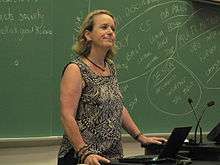Lise Getoor
Lise Getoor is a professor in the Computer Science Department,[1] at the University of California, Santa Cruz,[2] and an adjunct professor in the Computer Science Department[3] at the University of Maryland, College Park.[4] Her primary research interests are in machine learning and reasoning with uncertainty, applied to graphs and structured data. She also works in data integration, social network analysis and visual analytics. She has edited a book on Statistical relational learning that is a main reference in this domain.[5] She has published many highly cited papers in academic journals and conference proceedings.[6][7][8][9] She has also served as action editor for the Machine Learning Journal, JAIR associate editor, and TKDD associate editor. She is a board member of the International Machine Learning Society, has been a member of AAAI Executive council, was PC co-chair of ICML 2011, and has served as senior PC member for conferences including AAAI, ICML, IJCAI, ISWC, KDD, SIGMOD, UAI, VLDB, WSDM and WWW.
Lise Getoor | |
|---|---|
 Getoor in 2011 | |
| Born | Seattle, WA |
| Nationality | American |
| Alma mater | |
| Known for | |
| Awards | |
| Scientific career | |
| Fields |
|
| Institutions | |
| Doctoral advisor | Daphne Koller |
| Other academic advisors | Stuart J. Russell |
| Website | getoor |
She received her Ph.D. from Stanford University,[10] her M.S. from UC Berkeley, and her B.S. from UC Santa Barbara. Prior to joining University of California, Santa Cruz, she was a professor at the University of Maryland, College Park until Nov 2013.[11]
Recognition
Getoor has multiple best paper awards, an NSF Career Award, and is an Association for the Advancement of Artificial Intelligence (AAAI) Fellow.[12] In 2019, she was elected as an ACM Fellow "for contributions to machine learning, reasoning under uncertainty, and responsible data science", [13] was selected as a Distinguished Alumna of the UC Santa Barbara Computer Science Department, [14] was awarded the UCSC WiSE Chancellor's Achievement Award for Diversity, [15] and was selected to give the UC Santa Cruz Faculty Research Lecture 2018-19, one of the highest recognitions given to UC faculty. [16]
References
- webmaster. "Computer Science - Jack Baskin School of Engineering". cs.soe.ucsc.edu.
- "Lise Getoor - Jack Baskin School of Engineering". cs.soe.ucsc.edu.
- "UMD Department of Computer Science". cs.umd.edu.
- "Lise Getoor". www.cs.umd.edu.
- "Introduction to Statistical Relational Learning". www.cs.umd.edu.
- Lise Getoor publications indexed by Google Scholar

- Lise Getoor at DBLP Bibliography Server

- "AMiner, social@aminer.org". arnetminer.org.
- "Lise Getoor - Department of Computer Science, University of California Santa Cruz - VideoLectures.NET". videolectures.net.
- Lise Carol Getoor at the Mathematics Genealogy Project
- "Lise Getoor - Computer Science Department- University of Maryland (UMD)". www.umiacs.umd.edu.
- "Elected AAAI Fellows". www.aaai.org.
- 2019 ACM Fellows Recognized for Far-Reaching Accomplishments that Define the Digital Age, Association for Computing Machinery, retrieved 2019-12-11
- "Distinguished Lecturer: Lise Getoor | UCSB Computer Science". www.cs.ucsb.edu. Retrieved 14 July 2020.
- "Prof. Lise Getoor honored with 5th annual Women in Science and Engineering Award". Jack Baskin School of Engineering. Retrieved 14 July 2020.
- McGirk, James. "Data scientist Lise Getoor to give annual Faculty Research Lecture on Feb. 26". UC Santa Cruz News. Retrieved 14 July 2020.